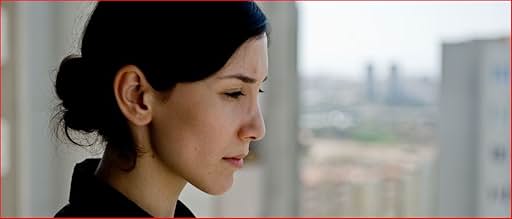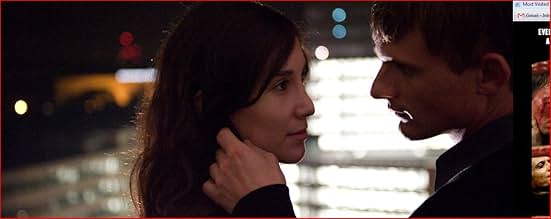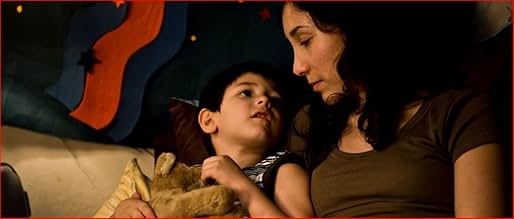VALUTAZIONE IMDb
7,5/10
5641
LA TUA VALUTAZIONE
Umay, una giovane donna di origine turca, lotta per una vita indipendente e autodeterminata in Germania contro la resistenza della sua famiglia. La sua lotta dà inizio a una dinamica che si ... Leggi tuttoUmay, una giovane donna di origine turca, lotta per una vita indipendente e autodeterminata in Germania contro la resistenza della sua famiglia. La sua lotta dà inizio a una dinamica che si traduce in una situazione di pericolo di vita.Umay, una giovane donna di origine turca, lotta per una vita indipendente e autodeterminata in Germania contro la resistenza della sua famiglia. La sua lotta dà inizio a una dinamica che si traduce in una situazione di pericolo di vita.
- Regia
- Sceneggiatura
- Star
- Premi
- 30 vittorie e 14 candidature totali
Gümeç Alpay Aslan
- Zeynep
- (as Gümec Alpay)
Recensioni in evidenza
The film she she is a victim of the traditional culture, in the cultural system of human nature, she just husband and home accessories, and is never her own most of the world are all traditional male-dominated roles if which day I hope the human progress in addition to the increasingly advanced technology and the trend of men's and women's position is equal
10ssdd_000
I would like to thank everyone who created this heart breaking movie, you might question the story line if it's true story or not. I have signed up just to tell you that it's true and some women who have suffered like Umay and had experienced much more greater pain and near death experience from there own family. I'm one of them.. a 30 years old woman with 7 years old child. The difference between me and Umya is that when she found the door locked in her family place, she called the police And I can't ! the difference is she is living in country that respects humans and offer help to anyone in danger while I'm not .. I'm living in the most restricted religious country that gave men the power in everything to control a women life. I have called violence police unite and they couldn't reach me. I have been threatened by machine gun day and night. I can't take my son and run away cause nothing can be done without guardian permission. My story continues and this movie have given my strength to fight my own battle. The question will remains (am I allowed to take the decision of my son's life.. or leave my son with my family so he do experience the life of a refugee with his mom ?) Thank you again .. this movie touched my heart and I'll always remember Umay ..
This film is very realistic. Its detailed depiction of one Turkish family living in Berlin casts overtones for a greater problem of European multiculturalism. But forget the wider scope of those implications for now. The film is very focused on Turkish culture within Germany and one of its great weaknesses: what it considers to be saving the "honor" of the family. The older daughter in the film has left her violent and abusive husband in Turkey and moved back to her family in Germany. Her parents immediately side with her husband, and they repeatedly ask the daughter to return to him. But the daughter has sacrificed much to get away, and will not return. After an attempt to kidnap her son and return him to the father fails, she moves out...and moves again...and moves again as problems mount. Her younger brother and sister, although initially supportive of her, slowly begin to turn against her as the shame of her living independently with child causes the Turkish community to isolate the family. This ultimately leads to a final decision by the men in the family, with tragic results.
The family is Muslim, although Islam is not portrayed as the reason why the family is shamed by the older daughter. In the culture, it is easy for an independent woman to bring shame to the family, especially if she leaves her husband. At no time do the parents ever seriously consider the perspective of their daughter. It is quite clear, she has to maintain the family honor at all costs; which in this case means returning to her husband. As the daughter continues to make unwise choices by maintaining contact with her family because she loves them, the unwritten codes of this "honor" system will drive the family into greater acts of cruelty. This film can make you very angry indeed at the injustice to women done by patriarch based communal cultures. The "honor" that they cling to is so twisted. It is based on a superficial sense of righteousness that has little basis in truth. It is more concerned with appearances than justice. More concerned with blind obedience than righteousness. And that concept is promoted in Islam, though not exclusively.
This film should be mandatory viewing for any woman in similar straits as the main character in the film who has needed to separate from the family for safety. The Germans have provided good resources for such women, but they are advised, "For now, avoid contact with your family." One of this beautifully done film's main points is: Once you leave or are forced to leave the family, it may be for good. You cannot expect your family to sympathize with you, support you, or even accept you as family. There is a good chance they WILL turn against you if the community slanders the family. And a woman who leaves her abusive husband, lives alone, calls the police for safety, or takes any action to safeguard her life and livelihood may very well be thought of as nothing more than a "whore" by the rest of the German Turkish community. Contact your family again at risk to your life! I would wish that Turkish men (those who are perpetrators, that is) who see this would also feel ashamed for some of their sexist standards, but I don't know if they would...
The film is very moving and well done. The actors all fulfill their roles, particularly the leading lady. The eye communication of the cast is extremely profound, leaving you wondering about all of the unspoken thoughts stewing in their heads. The writing allows sympathy with all of the characters while still clearly pointing out who is right and who is wrong. You see they all have deep passions about righteousness. It's just that some are righteous and others are not. It is a simple story that casts deep shadows on complexities of cultural clashes. This is not a film that will break grounds in cinematography, but it is a brave film and urgent as the Muslim (both immigrant and native) population rises in Europe. Hopefully this will start a trend that will cause the Turkish culture to think about what true honoring of the family really is.
The family is Muslim, although Islam is not portrayed as the reason why the family is shamed by the older daughter. In the culture, it is easy for an independent woman to bring shame to the family, especially if she leaves her husband. At no time do the parents ever seriously consider the perspective of their daughter. It is quite clear, she has to maintain the family honor at all costs; which in this case means returning to her husband. As the daughter continues to make unwise choices by maintaining contact with her family because she loves them, the unwritten codes of this "honor" system will drive the family into greater acts of cruelty. This film can make you very angry indeed at the injustice to women done by patriarch based communal cultures. The "honor" that they cling to is so twisted. It is based on a superficial sense of righteousness that has little basis in truth. It is more concerned with appearances than justice. More concerned with blind obedience than righteousness. And that concept is promoted in Islam, though not exclusively.
This film should be mandatory viewing for any woman in similar straits as the main character in the film who has needed to separate from the family for safety. The Germans have provided good resources for such women, but they are advised, "For now, avoid contact with your family." One of this beautifully done film's main points is: Once you leave or are forced to leave the family, it may be for good. You cannot expect your family to sympathize with you, support you, or even accept you as family. There is a good chance they WILL turn against you if the community slanders the family. And a woman who leaves her abusive husband, lives alone, calls the police for safety, or takes any action to safeguard her life and livelihood may very well be thought of as nothing more than a "whore" by the rest of the German Turkish community. Contact your family again at risk to your life! I would wish that Turkish men (those who are perpetrators, that is) who see this would also feel ashamed for some of their sexist standards, but I don't know if they would...
The film is very moving and well done. The actors all fulfill their roles, particularly the leading lady. The eye communication of the cast is extremely profound, leaving you wondering about all of the unspoken thoughts stewing in their heads. The writing allows sympathy with all of the characters while still clearly pointing out who is right and who is wrong. You see they all have deep passions about righteousness. It's just that some are righteous and others are not. It is a simple story that casts deep shadows on complexities of cultural clashes. This is not a film that will break grounds in cinematography, but it is a brave film and urgent as the Muslim (both immigrant and native) population rises in Europe. Hopefully this will start a trend that will cause the Turkish culture to think about what true honoring of the family really is.
The treatment of Muslim societies in the media in general and in film in particular has been subject to much agenda setting and bias. On the one hand, this has led to frequently arrogant defamation of the cultures of one fifth of humanity, on the other hand, the discourse has helped to highlight problems of Muslim integration which are often ignored under the convenient excuse of multiculturalism. What is more important: respect for other cultures living among us or concern for the plight of the individual subjected to an excessive chauvinism that allows for nothing but submission to it?
Feo Aladag's position on this is clear, but she avoids simplifications by sticking to one woman's story, and keeping that story close, while not identical, to the events that inspired it - namely the much publicized 2005 murder of Hatun Sürücü in Berlin, albeit with a surprising twist. Some may find the depictions of a regressive macho cult in German-Turkish families and social life exaggerated, especially since the acting of the supporting cast is a bit shaky at times. But as someone who has lived in a Turkish neighborhood in Berlin, I have to declare it's not. It's disturbingly close to the truth - not the distorted truth of tabloids, but the truth of people I'm close to.
The minimalistic approach of the film would usually render it a rather harmless affair, in spite of its controversial subject matter - were it not for Sibel Kekilli's outstanding performance, for which she received, among other awards, best actress at the Tribeca festival. Her heartfelt, knowing and yet forgiving gaze at the suffocating world she lives in speaks of personal experience with the role she portrays. 'When we leave' establishes her as the most exciting German actress of today.
It should be noted, by the way, that Islamic law does not condone honorary murders and considers these just as much as crimes as Western law does. Also, this practice is not exclusive to Muslim societies, but used to be widespread in Christian countries as well, where it might still occur as a justification for homicide. But these clarifications could not have been included in this film, which tells one story, and tells it well.
Feo Aladag's position on this is clear, but she avoids simplifications by sticking to one woman's story, and keeping that story close, while not identical, to the events that inspired it - namely the much publicized 2005 murder of Hatun Sürücü in Berlin, albeit with a surprising twist. Some may find the depictions of a regressive macho cult in German-Turkish families and social life exaggerated, especially since the acting of the supporting cast is a bit shaky at times. But as someone who has lived in a Turkish neighborhood in Berlin, I have to declare it's not. It's disturbingly close to the truth - not the distorted truth of tabloids, but the truth of people I'm close to.
The minimalistic approach of the film would usually render it a rather harmless affair, in spite of its controversial subject matter - were it not for Sibel Kekilli's outstanding performance, for which she received, among other awards, best actress at the Tribeca festival. Her heartfelt, knowing and yet forgiving gaze at the suffocating world she lives in speaks of personal experience with the role she portrays. 'When we leave' establishes her as the most exciting German actress of today.
It should be noted, by the way, that Islamic law does not condone honorary murders and considers these just as much as crimes as Western law does. Also, this practice is not exclusive to Muslim societies, but used to be widespread in Christian countries as well, where it might still occur as a justification for homicide. But these clarifications could not have been included in this film, which tells one story, and tells it well.
This kind of story is only really interesting if it is true to life. I don't know what the day to day texture of life tends to be like for Turks in Germany -- I don't even know if the characters are ethnic Turks or Kurds -- so I have to trust the movie. But I don't know whether I should. Yes, the outlines of the plot come from a true story. I can forgive the movie for ignoring that Germany and Turkey have both signed the Hague Abduction Convention, which would allow the father to get his son back. Yes, many parts of the Muslim world share the sense that honor is tied to being able to control one's women, and honor killings happen. Yes, some children in a family may acculturate differently than others. And, yes, it was nuanced. But that does not necessarily mean that the nuances are there in life rather than only in the director's head. Ingmar Bergman comes to mind, and Amos Gitai (some of whose movies I somehow forced myself to watch all the way through). My suspicions were also raised by When We Leave's contemplative quiet, which is common in this kind of art movie but not in real life. But, let me re-emphasize, I don't really know that the picture is a fantasy, I only suspect.
Lo sapevi?
- QuizGermany's official submission for the Best Foreign Language Film Award at the 83rd Annual Academy Awards in 2011.
- ConnessioniFeatures Biçak Sirti (2007)
- Colonne sonoreSO 36 - Party
Performed by Steffen Irlinger & Marian Mülle
(P) 2010 Colosseum Music Entertainment GmbH
I più visti
Accedi per valutare e creare un elenco di titoli salvati per ottenere consigli personalizzati
- How long is When We Leave?Powered by Alexa
Dettagli
- Data di uscita
- Paese di origine
- Siti ufficiali
- Lingue
- Celebre anche come
- When We Leave
- Luoghi delle riprese
- Aziende produttrici
- Vedi altri crediti dell’azienda su IMDbPro
Botteghino
- Lordo Stati Uniti e Canada
- 19.631 USD
- Fine settimana di apertura Stati Uniti e Canada
- 6018 USD
- 30 gen 2011
- Lordo in tutto il mondo
- 1.338.132 USD
- Tempo di esecuzione1 ora 59 minuti
- Colore
- Mix di suoni
- Proporzioni
- 2.35 : 1
Contribuisci a questa pagina
Suggerisci una modifica o aggiungi i contenuti mancanti

Divario superiore
By what name was Die Fremde (2010) officially released in India in English?
Rispondi

























